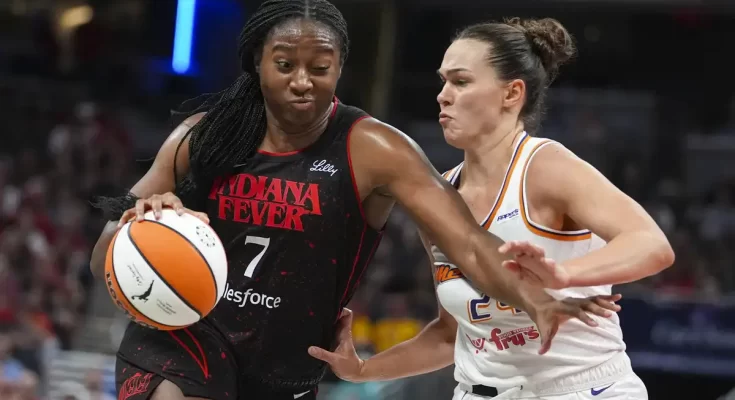Aari McDonald’s Career Night, Boston’s Fourth-Quarter Surge, and a Third Straight Win: A 107-101 Victory Over the Mercury That Lit Up the Court
From the moment the game tipped off in Indianapolis, there was a quiet electricity in the air—a subtle but palpable sense that something different was about to unfold. The Indiana Fever, shorthanded and still adjusting to life without Caitlin Clark for the moment, came into their matchup against the Phoenix Mercury with their backs pressed against the wall. But adversity often reveals hidden strength, and on this night, it came from an unexpected hero: Aari McDonald.
McDonald wasn’t even on the roster to start the season. She had arrived through a hardship contract, her role unclear and her future uncertain. But opportunity comes quickly in the WNBA, and McDonald met it with poise, speed, and confidence. Her performance against the Mercury wasn’t just a career high—it was a declaration. With 27 points, 4 assists, and 2 steals, McDonald stepped into the spotlight and lit it up with a sense of purpose that lifted her team to a 107-101 win. For a player who had seen both ends of the league’s tough roster realities, it was a breakthrough that was as emotional as it was electric.
From the opening quarter, McDonald’s energy stood out. She played downhill, constantly attacking the paint, slipping past defenders with her signature burst, and finishing through contact. Her early drives drew fouls and set the tone for a game in which she went a perfect 10 for 10 from the free-throw line. What made her performance even more valuable was its timing—Indiana was playing without its star rookie, and the offensive burden needed to be shouldered by someone new. McDonald didn’t hesitate. She stepped up as though she’d been leading this team all year.
Each possession seemed to build her confidence. The Mercury, caught off guard by her explosiveness, struggled to stay in front of her. She operated with a relentless tempo, forcing Phoenix to collapse inside, which then opened up perimeter opportunities for Indiana’s shooters. McDonald was not just scoring—she was orchestrating. Her passes out of drives were crisp, precise, and perfectly timed. In a league filled with elite guards, she looked every bit the part.
While McDonald powered the first three quarters, Indiana needed a closer. That’s where Aliyah Boston came in. After a quiet first half by her standards, Boston dominated the fourth quarter with a performance that was as commanding as it was clinical. She scored Indiana’s first 14 points of the final period, turning what had been a tight contest into a lead that the Fever would not relinquish. She rebounded with authority, sealed defenders in the post, and made timely buckets off smart footwork and powerful finishes. When the Fever needed stability in the paint and someone to anchor both ends of the floor, Boston answered.
As Boston caught fire in the final 10 minutes, the Fever’s offense surged. The team hit their 10th three-pointer midway through the fourth quarter—a corner shot from Chloe Bibby that brought the home crowd to its feet. Then came a pivotal sequence when Sophie Cunningham drilled a deep three while drawing contact, completing a four-point play that extended Indiana’s lead to double digits. From that point, it felt like the momentum belonged entirely to the Fever.
But Phoenix wouldn’t go quietly. Led by a strong performance from Kahleah Copper, who dropped 22 points, and the interior dominance of Natasha Mack, the Mercury pushed back. Sami Whitcomb added three-point shooting from the wing, and Phoenix trimmed the deficit late in the fourth to make the final minutes uncomfortable for Indiana. Still, the Fever’s composure held. Damiris Dantas came off the bench and delivered 12 points with timely rebounding, while Cunningham’s hustle on both ends helped close the game out.
It was a full-team effort, but it circled back to McDonald and Boston—the two forces that shaped the arc of the game. Boston finished with 22 points and 12 rebounds, notching her fourth consecutive double-double. She protected the rim in crunch time and gave the team breathing room every time Phoenix inched closer. McDonald, meanwhile, had already established her impact. She had done the heavy lifting through three quarters, giving Indiana enough of a cushion for Boston to work her magic in the fourth.
What made this win even more meaningful for Indiana was the context surrounding it. It marked their third straight victory—something the Fever hadn’t achieved since early in the season. And it was done without the guiding presence of Clark, whose absence left a void in scoring and playmaking. But rather than shrink, the team responded with depth, determination, and grit. Five players scored in double figures. The bench contributed 33 points. Everyone played their part, and the chemistry—often elusive during parts of the season—looked natural and unified.
The game was a milestone not just in the standings but in identity. With the victory, the Fever moved to 15-12 on the year and maintained their position in the playoff picture. More importantly, it demonstrated that this is no longer a one-player team. While Clark may be the centerpiece, the foundation around her is solidifying. Boston continues to grow into her role as a franchise big. McDonald, seemingly out of nowhere, has become indispensable. Cunningham brings veteran toughness. And players like Bibby and Dantas are proving their value in pressure-packed moments.
For McDonald, the journey to this moment had been anything but smooth. She had been released by the Sparks before the season began. She signed her hardship deal with Indiana only due to a rash of injuries, and even then, her role was temporary. But she stayed ready. She studied the Fever’s playbook before even arriving, absorbing film and learning sets in advance. That preparation paid off. Once signed to a full contract in late June, she hit the ground running. And now, in just her ninth start, she delivered a game that was equal parts redemption and arrival.
Her presence has transformed Indiana’s backcourt rotation. When McDonald is on the floor, the Fever are faster, more dynamic, and better defensively. Her ability to get into the paint without the ball sticking disrupts opposing defenses, while her perimeter defense adds a level of intensity that matches the team’s identity. Since she became a regular starter, Indiana’s offense has looked more balanced. Her chemistry with Boston is building. Her confidence is growing. And her performance against the Mercury served as the latest, loudest proof of what she brings.
The win also had implications for Phoenix. The Mercury, now sliding in the standings, have lost four of their last five games. They showed resilience, but their defensive lapses in key moments—particularly in the fourth—cost them. While their stars are capable, the lack of depth and cohesion compared to Indiana became evident late. They simply couldn’t match the Fever’s collective push.
As the final buzzer sounded and the crowd stood in ovation, there was a sense that this game may be looked back on as a turning point. Not just a win, but a message. Indiana is no longer waiting for the future to arrive—it’s here. The team that once hovered around inconsistency is now showing signs of structure, identity, and rhythm. There is urgency in how they play. There is belief in how they execute. And as they head toward the final stretch of the season, that belief could be the difference.
After the game, McDonald’s smile said it all. She didn’t need to say much—her performance had done the talking. It was more than just a career night. It was a validation of years of work, of staying ready, of proving that sometimes, the right player just needs the right moment. And on this night, the moment belonged to her.
Boston, ever steady, praised her teammates and downplayed her dominant fourth quarter. But the stats told the story: when it mattered most, she took over. It wasn’t flashy. It was professional. It was powerful. And it reminded everyone why she remains the cornerstone of the franchise.
The Fever now prepare for their next challenge, with momentum at their backs and a clearer sense of who they are. No matter when Clark returns, Indiana has shown that it can win with depth, with defense, with hustle—and with players like McDonald who are ready to seize the moment. This 107-101 victory was more than just a notch in the win column. It was a coming-of-age performance from a team growing into its potential, and from a guard who reminded everyone that she belongs on this stage.



